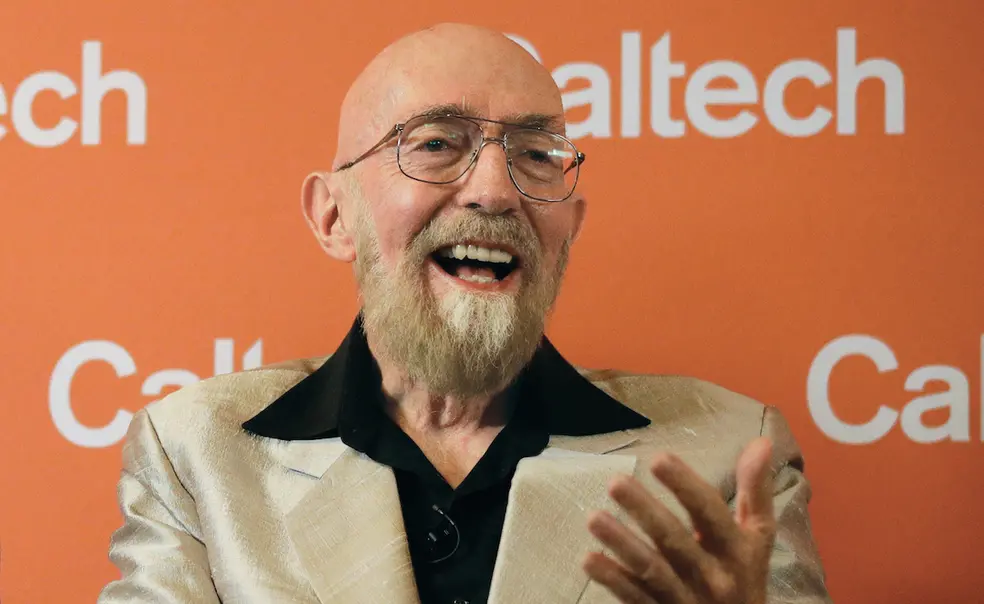Kip Thorne *65: A Celebrated Finding, a Coveted Prize
Alumnus receives physics Nobel Prize for ‘the discovery that shook the world’
Physicist Kip Thorne *65 had a night of interrupted sleep Oct. 3 for one of the best reasons of all: a call from Sweden. Thorne was told at about 2:15 a.m. that he, along with collaborators Rainer Weiss and Barry C. Barish, would be awarded the Nobel Prize in Physics for their pioneering work on the Laser Interferometer Gravitational Wave Observatory (LIGO).
A year after Albert Einstein put forth his theory of relativity in 1915, he posited the existence of gravitational waves, which he believed had the ability to send ripples through the fabric of time and space. Yet Einstein thought that the waves — which travel at the speed of light and are often created by large forces such as two black holes colliding — were impossible to measure.
READ MORE: A Physicist in Hollywood
Kip Thorne *65, the scientist behind Interstellar, gets a new title: Movie Mogul
Then one night in 1975, Weiss, a physics professor at MIT, and Thorne, now professor emeritus of physics at Caltech, stayed up all night puzzling how these waves might be detected. Their work laid the foundation of what would take 40 years and $1 billion to complete, resulting in the construction of LIGO: two L-shaped antennas — one in Livingston, La., and one in Hanford, Wash. — that shoot laser beams through two perpendicular vacuum tunnels 2 1/2 miles long. These two antennas, run jointly by MIT and Caltech, are sensitive enough to discern gravitational waves, which register as an infinitesimal difference in the lasers’ length, generally 1/10,000th of the width of a proton.
Barish, also a Caltech physics professor, joined the LIGO effort in 1994. He and Thorne will share one half of the approximately $1 million award, while Weiss will receive the rest.In September 2015, an updated version of LIGO started up, and almost immediately it made its first record of a gravitational wave, which is heard as a chirp. That chirp made headlines across the globe, and since then, LIGO has sensed at least four more black-hole collisions. The Royal Swedish Academy is calling LIGO’s detection of the waves “the discovery that shook the world.”
According to Thorne, Princeton had everything to do with making LIGO a reality: In the late 1970s, the Caltech president was Marvin “Murph” Goldberger, who had been Thorne’s professor at Princeton. After hearing Thorne’s proposal for LIGO, Goldberger phoned Princeton physics professor Bob Dicke ’39, who was familiar with Thorne’s work.
“Goldberger asked if [LIGO] was a sensible thing to do, and Dicke gave his blessing,” Thorne told PAW in an email. “Goldberger gave the final approval, and [Caltech] sunk $2 million into the effort. So it all came about because of these connections with Princeton.”
A version of this story appears in the Oct. 25, 2017, print edition.













1 Response
Paul F. Jacobs *66
8 Years AgoKip Thorne *65’s Nobel
Congratulations to Kip Thorne *65 (Princetonians, Oct. 25)! As a contemporary, I have followed his sparkling career with interest. Since Kip has accomplished many things over a long and distinguished career, it seemed wonderfully appropriate that he became a Nobel laureate for his part in the recently successful detection of gravity waves using the phenomenally precise Laser Interferometer Gravitational Wave Observatory (LIGO) instrumentation that he helped develop. I am absolutely astounded that LIGO is evidently able to unambiguously detect gravity waves through minuscule changes in its own length, while operating in the presence of all sorts of spurious background-noise sources such as tiny temperature fluctuations, wind gusts, and even trees falling in the nearby forest.
One long overdue item I would like to see addressed relates to the very prediction of gravity waves originally described by Albert Einstein as a result of his groundbreaking work in general relativity more than a century ago. In one of the extreme ironies of modern physics, the very theory that forms the underpinning of Professor Thorne’s (and many others’) work, and which represents one of the towering achievements of the human mind, has itself never been awarded the Nobel Prize! I would like to suggest that perhaps a certain committee in Sweden might see fit to posthumously award Albert Einstein a similar honor. Better late than never!